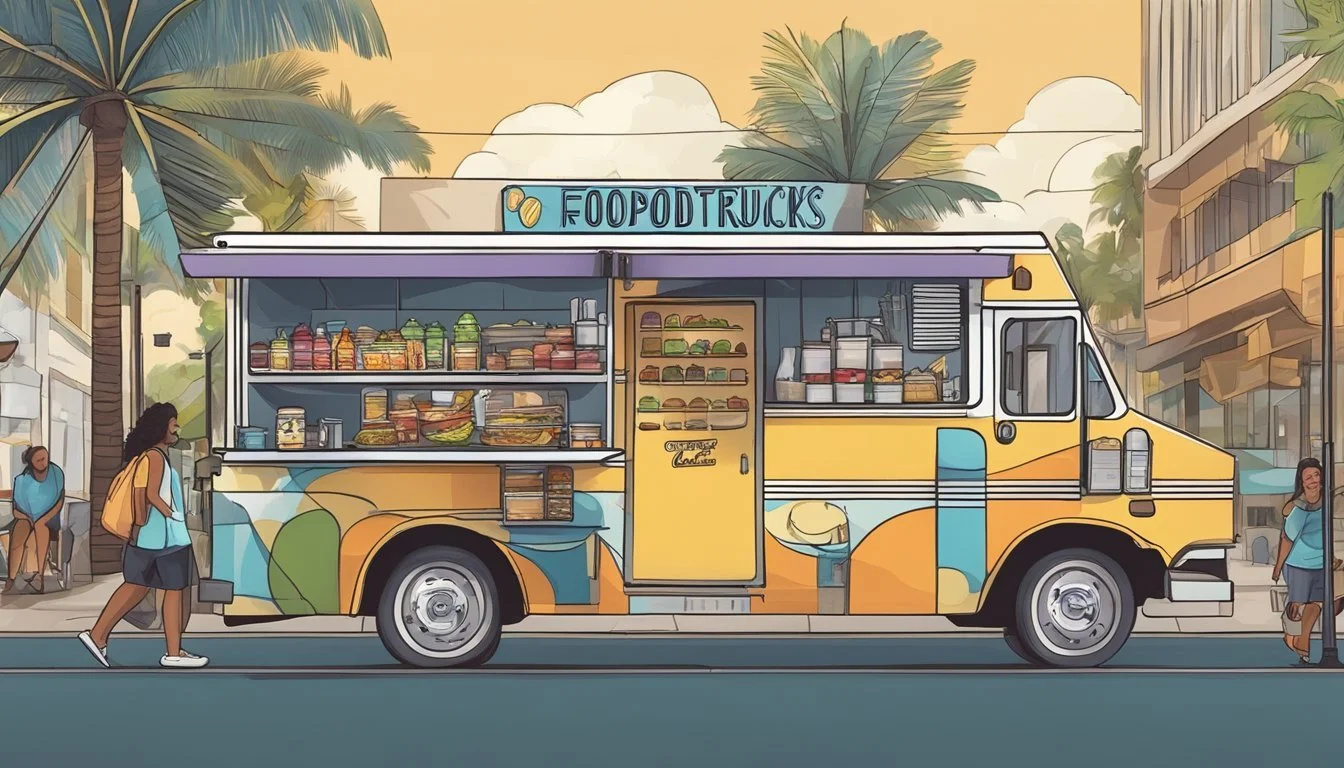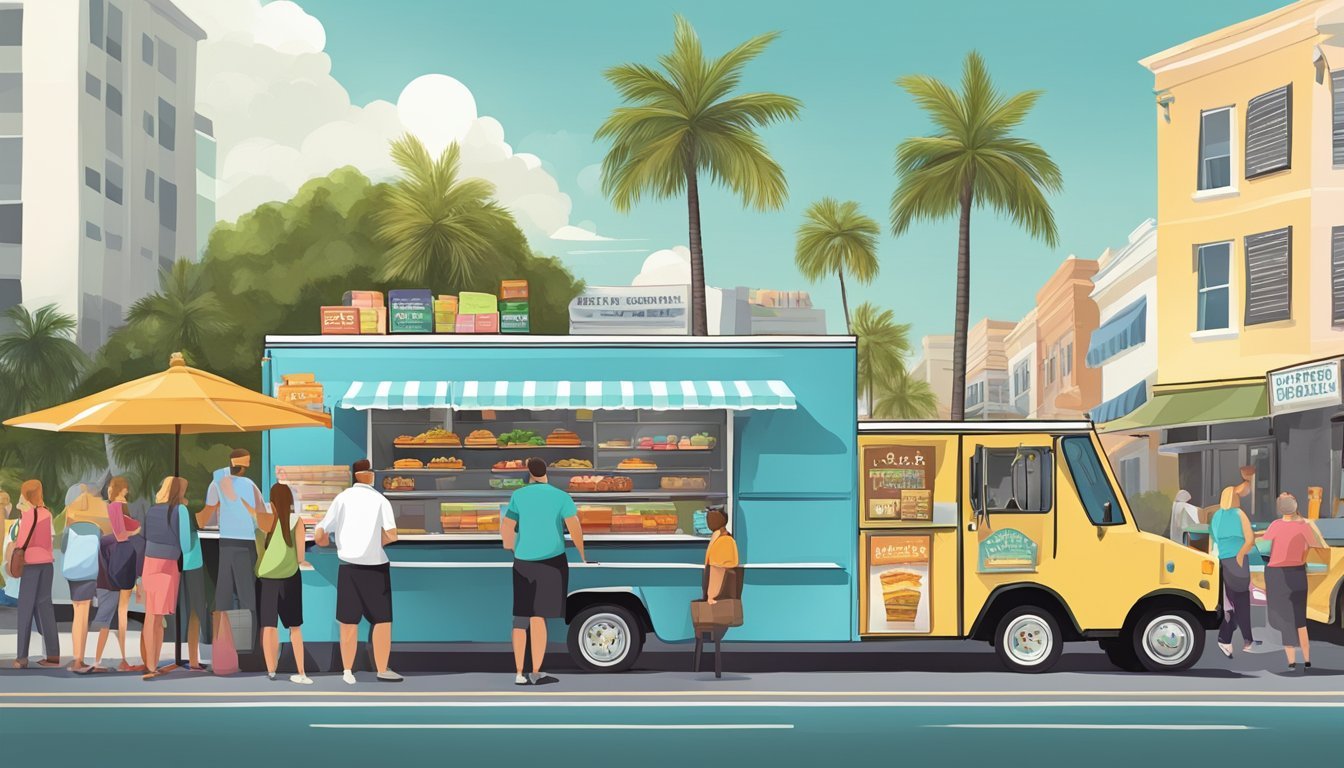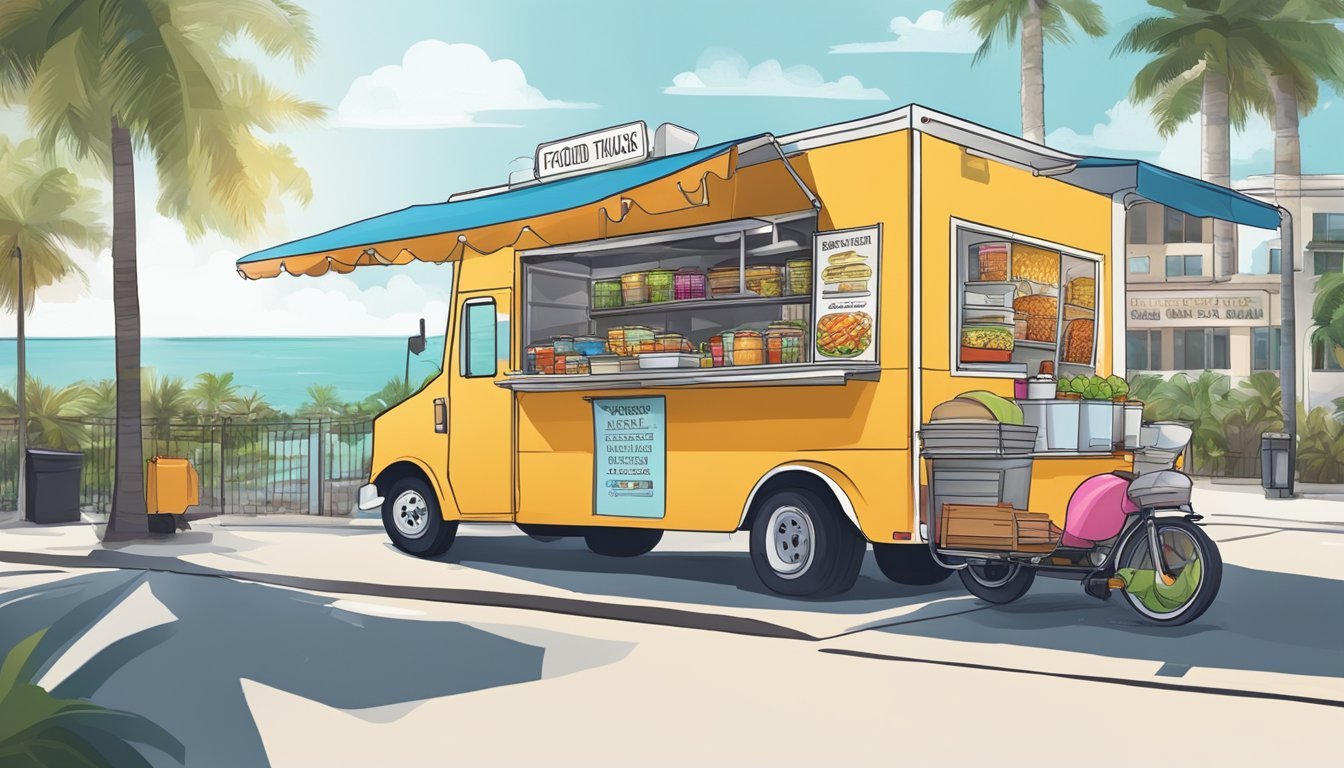Food Truck Laws Fort Lauderdale, Florida
Navigating Regulations for Street Vending
Starting a food truck business in Fort Lauderdale, Florida, presents a dynamic opportunity for entrepreneurs looking to enter the city's vibrant street food scene. Fort Lauderdale's sun-kissed streets and bustling urban areas provide an ideal backdrop for mobile culinary ventures. However, it is essential for food truck operators to understand and adhere to the specific regulations that govern the operation of food trucks within the city limits.
The City of Fort Lauderdale has a set of local food truck laws and regulations, which are designed to ensure safety and fair business practices. These regulations include zoning laws, which determine where food trucks can operate, and permit requirements, which are necessary for legal operation. Moreover, food truck operators in Fort Lauderdale must comply with both city ordinances and state-level mandates issued by the Florida Department of Agriculture and Consumer Services, which oversees food safety and handling procedures for mobile food establishments.
Understanding Food Truck Regulations in Fort Lauderdale
In Fort Lauderdale, food truck operators must navigate a range of specific regulations governing where they can do business, the permits they require, health standards they must meet, their vehicle specifications, and the hours during which they're allowed to operate.
Zoning and Location Restrictions
Fort Lauderdale has specific zoning rules that determine where food trucks can operate. These rules ensure trucks do not impede traffic and are located in areas that are designated for commercial use. Operators should consult the City's zoning maps and regulations to find permissible spots for setting up their businesses.
Permits and Licenses Required
For a food truck to operate legally in Fort Lauderdale, it must obtain the necessary permits and licenses. This typically involves coordination with the Florida Department of Business and Professional Regulation as well as local government offices. A general list of required permits includes a mobile food dispensing vehicle license, business tax receipt, and food service license.
Health and Safety Inspections
Regular health and safety inspections are a critical requirement for food trucks in Fort Lauderdale, reflecting the standards set by the Department of Health. Inspections ensure compliance with the Florida Food Safety Act, and operators must display their food hygiene rating visibly at all times.
Vehicle Requirements
The vehicle used as a food truck must meet particular safety and operational standards. It undergoes inspection by the Department of Business and Professional Regulation to ensure it is equipped for culinary operations and adheres to safety regulations, including proper waste disposal and sanitary food storage facilities.
Operating Hours and Limitations
Operating hours and location duration may be limited based on the specific area within Fort Lauderdale. Some areas may impose restrictions on the length of time a food truck can remain in one location. Food truck operators must adhere to these time limits to avoid penalties and maintain good standing within the community.
Starting Your Food Truck Business
Before launching a food truck business in Fort Lauderdale, Florida, it's crucial to navigate the legal requirements and business planning processes effectively. This ensures compliance and can set the stage for potential success.
Creating a Detailed Business Plan
A business plan is the foundation of any successful venture and should include a precise menu, projected profit margins, and a carefully thought-out branding strategy including the business name. This document should outline short-term and long-term goals, target market, and marketing strategies to create a road map for your food truck.
Securing Funding and Managing Finances
When starting a food truck, securing funding is a significant step. Explore options such as small business loans, investors, or crowdfunding to cover startup costs, which can include fees for obtaining a food service license and purchasing insurance. Once funding is acquired, prudent financial management is vital for tracking expenses and revenue to maintain a healthy cash flow.
Choosing the Right Business Structure
Deciding on the appropriate business structure, such as an LLC or partnership, impacts tax obligations, liability, and operation. An LLC can protect personal assets from business debts, while a partnership allows shared responsibility. Business owners should also secure an Employer Identification Number (EIN) for tax purposes.
Naming Your Food Truck
The business name is a critical part of your brand. It should be memorable, reflect the food truck's personality, and adhere to legal requirements. Conduct a name search to ensure that the name isn't already in use and register it with the state to solidify your brand identity.
To operate in Fort Lauderdale, securing a business license and an adequate insurance policy are also imperative to protect the business and comply with state regulations.
Licensing and Registration
Before launching a food truck business in Fort Lauderdale, Florida, it is essential to navigate through various licensing and registration procedures to comply with local and state regulations. This includes obtaining a general business license, specific food service and health licenses, vehicle licensing for the food truck, and completing applicable sales tax and employer registrations.
Obtaining a General Business License
To operate a food truck in Fort Lauderdale, one must acquire a General Business License from the local government. This license confirms that the food truck is a legally recognized business within the city. Corporations, Limited Liability Companies, and Limited Partnerships also need to register with the Florida Department of State.
Necessary Food Service and Health Licenses
Food service licenses are mandatory and can be obtained from the Florida Department of Business and Professional Regulation. Additionally, the food truck must meet the health standards set by the Florida Department of Health. Requirements may include food manager certification and a sanitation inspection. Compliance with the Florida Department of Agriculture and Consumer Services is also crucial, since it regulates and inspects food establishments.
Food Truck Vehicle Licensing
The food truck itself is considered a vehicle and thus requires proper vehicle registration, typically handled by the Florida Department of Highway Safety and Motor Vehicles (DHSMV). The food truck must pass inspection to ensure it is safe for operation on public roads.
Sales Tax and Employer Registrations
Food trucks in Fort Lauderdale must register for a sales tax permit with the Florida Department of Revenue to collect and remit sales tax. If a food truck plans to employ workers, it must apply for an Employer Identification Number (EIN) with the IRS. This number is necessary for reporting taxes to the federal government and for many state tax purposes.
Compliance with Florida Food Laws
Operating a food truck in Fort Lauderdale, Florida, requires meticulous adherence to state regulations. Food truck owners must ensure that they meet all requirements for licenses, engage in proper food handling techniques, and align with rigorous safety standards.
Adhering to Food Safety Guidelines
Florida's food safety laws mandate that food truck operators complete a Food Handler's training program, thus emphasising the importance of knowledgeable staff in preventing foodborne illnesses. They are to store and handle ingredients at correct temperatures and follow safe cooking practices to minimize health hazards.
Equipment and Ingredient Regulations
The state requires food trucks to have specific equipment, such as refrigeration units that maintain food at safe temperatures. The use of approved sources for ingredients is also regulated to ensure consumption safety. Food trucks must meet a set of guidelines focused on equipment and supplies to support hygienic food preparation and service.
Routine Inspections and Compliance
Regular inspections are a critical component of Florida’s compliance system. Food trucks can expect thorough checks from health officials to ensure adherence to state laws regarding licenses, commissary usage, and sanitation. Routine compliance helps safeguard public health and ensures food trucks can operate without legal hindrances related to food safety or consumption safety.
By abiding by these regulations, food truck operators in Fort Lauderdale contribute to a safer food service environment for both locals and tourists alike.
Operational Management
In managing a food truck business in Fort Lauderdale, operational management plays a critical role. It involves meticulous planning and adherence to regulations, particularly when it comes to employee management, securing the right insurance coverage, and engaging with industry associations.
Employee Hiring and Training
When hiring employees for a mobile food vendor operation, it's essential to ensure that they meet the standards set by Florida's food service regulations. Each individual should undergo a thorough test and training process focused on food safety, customer service, and operational efficiency. Employers are required to appoint a Certified Food Protection Manager to oversee food service operations per the Florida Department of Agriculture and Consumer Services guidelines.
Insurance and Liability Coverage
Adequate insurance is non-negotiable for mobile food vendors in Fort Lauderdale. They must obtain a comprehensive insurance policy that includes general liability, vehicle coverage, and potentially worker's compensation. This coverage protects the mobile retail business from unforeseen events and accidents that can affect both customers and employees.
Associations and Mobile Food Vendors
Engagement with local or national food truck associations can provide numerous benefits, including advocacy, networking, and access to resources. These organizations often serve as a bridge between food truck owners and regulatory bodies, helping to ensure that mobile food service operations comply with the latest laws and standards. Associations can also assist food truck businesses in staying updated on industry best practices and opportunities for growth.
Marketing and Expansion
Expanding a food truck business in Fort Lauderdale involves deliberate marketing strategies and fostering strong customer relationships. This demands a comprehensive understanding of one's target market and the utilisation of varied local platforms for promotion.
Defining and Reaching Your Target Market
Identifying the target market is critical for a food truck business. In Fort Lauderdale, food trucks may target beachgoers, professionals in downtown areas, or attendees at local Miami bars during nightlife hours. Key demographics might include age range, income levels, and dining preferences. Once defined, direct efforts like strategically parking near commissaries or large office complexes during lunchtime can effectively capture these specific audiences.
Leveraging Social Media and Local Events
Social media is a potent instrument for food trucks to reach a broader audience in Fort Lauderdale. They should maintain a dynamic presence on platforms like Instagram and Facebook, where they can showcase their culinary creations and update followers on their location. Participation in local events, such as food festivals or catering for private events, is equally important. Aligning with local bars for special occasions can also provide additional exposure and revenue.
Cultivating Branding and Customer Loyalty
Building a strong brand and customer loyalty is essential for any business plan to thrive. Food trucks can enhance their brand through a memorable logo, consistent color scheme, and unique selling propositions that set them apart. To develop loyalty, they can introduce loyalty programs or discounts for repeat visitors. Personalizing the experience by engaging with customers during service or via feedback through social media can solidify the return customer base in the competitive Fort Lauderdale food truck market.
Additional Considerations
Before diving into the specifics, food truck owners should be aware that running a successful mobile food business involves navigating customer feedback, understanding the intricacies of tax obligations, and safeguarding their brand. Effective management in these areas is crucial for long-term viability.
Dealing with Complaints and Feedback
Food truck operators should implement a systematic approach for handling complaints and feedback. Customer satisfaction can significantly impact a food truck's reputation, especially in a bustling city like Fort Lauderdale. Therefore, establishing a direct channel for customers to voice concerns—be it via a website, social media platform, or suggestion box—is key to fostering trust and improving service.
Understanding State and Federal Taxes
Every food truck business must adhere to state and federal tax obligations. In Florida, a mobile food vendor must register with the Department of Revenue. Food truck owners should be aware of the taxonomy of their business structure—whether they're an LLC, sole proprietorship, partnership, or corporation—as it will determine their specific tax liabilities and reporting requirements.
Florida State Taxes: Sales tax, unemployment tax, and other state-imposed taxes.
Federal Taxes: Income tax, self-employment tax, and possibly others depending on the business structure.
Trademark and Brand Protection
Lastly, protecting a food truck's brand is critical. This includes registering a trademark for the business name or logo. Protecting a brand helps prevent others from infringing upon the food truck's identity, ensuring the brand remains distinctive and reducing the chance of market confusion. Business owners can seek registration through federal and state-level entities to safeguard their trademarks.






